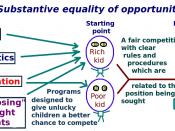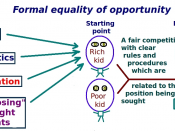Legal Studies
Analyze the notion of equality. Does equality in the law always bring equality in each circumstance? (Use case / media to highlight the four notions of equality)
Find a newspaper article or a contemporary case to answer the following:
1Choose a domestic issue showing a Human Rights issue (past in / review / give brief outline)
2Identify the Human Right/s violated or protected
3Assess the effectiveness of the law in protecting this human right
The notion of equality can be divided into four parts; Formal equality, equality of opportunity, equality before the law and equality of outcomes. Each is important in the aim to achieve equality in terms of law and judicial decisions. Together, the four parts are supposed to bring equality to all situations in society. However this is not the case. There are times when the notion of equality is impractical, and therefore does not always bring equality.
The first part of the notion of equality is formal equality. This occurs when the law provides that, in certain defined circumstances, everyone should be treated equally regardless of background, social or economic status, or person beliefs. Basically this means that people should be treated the same as everyone else, despite their differences. This can be through legislation, judicial decisions and government policies. An example where formal equality is not reached is in the case of homosexuals who wish to marry. In Australia, homosexual couples are not allowed to marry or have children, which says they are not equal to heterosexual people.
Equality of opportunity refers to the equal treatment of people in terms of their access to employment and other services. This provides that a person should be given the same opportunity when applying for a job despite their race, religion etc. However the main problem with...


